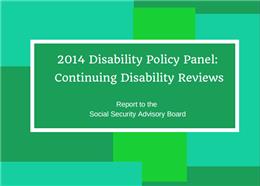 SUMMARY: The Social Security Advisory Board (SSAB) appointed the independent Disability Policy Panel (2014) to review the Social Security Administration’s (SSA’s) Continuing Disability Review (CDR) process, including the Medical Improvement Review Standard (MIRS) that must be applied in conducting CDRs. In general, the Panel found the CDR an effective tool for enhancing DI and Supplemental Security Income (SSI) program integrity. CDRs not only identify beneficiaries who no longer meet program eligibility criteria but also raise awareness of SSA oversight. CDRs are highly cost-effective, providing a nine to one payback ratio of benefit savings to administrative costs. This favorable ratio results in part from SSA’s use of statistical profiling and CDR mailers that focus full medical reviews on those cases where it considers medical improvement most likely. While generally giving the CDR process high marks for fulfilling its core function, the Panel also notes that CDRs are a less useful and appropriate tool for addressing other dimensions of program integrity. Alternative tools include quality control, pre-effectuation reviews, focused reviews, and Cooperative Disability Investigation (CDI) anti-fraud units. Getting the disability determination right the first time is considerably more efficient and equitable than relying on CDRs for subsequent error correction. Based on its analysis, the Panel formulated recommendations to Congress, SSA, and the SSAB in five issue areas: 1) the funding of CDRs, 2) MIRS, 3) CDRs in relation to SSA’s other payment integrity efforts, 4) the integration of CDRs with support for return to work, and 5) CDRs issues specific to SSI children and youth.
SUMMARY: The Social Security Advisory Board (SSAB) appointed the independent Disability Policy Panel (2014) to review the Social Security Administration’s (SSA’s) Continuing Disability Review (CDR) process, including the Medical Improvement Review Standard (MIRS) that must be applied in conducting CDRs. In general, the Panel found the CDR an effective tool for enhancing DI and Supplemental Security Income (SSI) program integrity. CDRs not only identify beneficiaries who no longer meet program eligibility criteria but also raise awareness of SSA oversight. CDRs are highly cost-effective, providing a nine to one payback ratio of benefit savings to administrative costs. This favorable ratio results in part from SSA’s use of statistical profiling and CDR mailers that focus full medical reviews on those cases where it considers medical improvement most likely. While generally giving the CDR process high marks for fulfilling its core function, the Panel also notes that CDRs are a less useful and appropriate tool for addressing other dimensions of program integrity. Alternative tools include quality control, pre-effectuation reviews, focused reviews, and Cooperative Disability Investigation (CDI) anti-fraud units. Getting the disability determination right the first time is considerably more efficient and equitable than relying on CDRs for subsequent error correction. Based on its analysis, the Panel formulated recommendations to Congress, SSA, and the SSAB in five issue areas: 1) the funding of CDRs, 2) MIRS, 3) CDRs in relation to SSA’s other payment integrity efforts, 4) the integration of CDRs with support for return to work, and 5) CDRs issues specific to SSI children and youth.
The members of the Panel were:
Bernadette Franks-Ongoy, Executive Director for Disability Rights Montana, Current Social Security Advisory Board (SSAB) member
Manasi Deshpande, Ph.D. Candidate in Economics at Massachusetts Institute of Technology (MIT) and Pre-doctoral Fellow at the National Bureau of Economic Research (NBER)
Elaine Fultz, PhD, Independent consultant, formerly professional staff member, House Ways and Committee, Social Security Subcommittee and official of the International Labor Organization, Social Security Department
Marsha Rose Katz, Project Director at the University of Montana Rural Institute in Missoula, Retired; Former SSAB Acting Chair
Renée M. Landers, Professor of Law and Director Health and Biomedical Law Concentration, Suffolk University Law School
Nicole Maestas, PhD, Director, RAND Center for Disability Research; Director, RAND Economics, Sociology and Statistics Department
Ken Nibali, formerAssociate Commissioner for Disability, Social Security Administration, Retired
James Smith, Budget and Policy Manager, Vermont Division of Vocational Rehabilitation
Arthur Spencer, former Associate Commissioner for Disability Policy, Social Security Administration, Retired